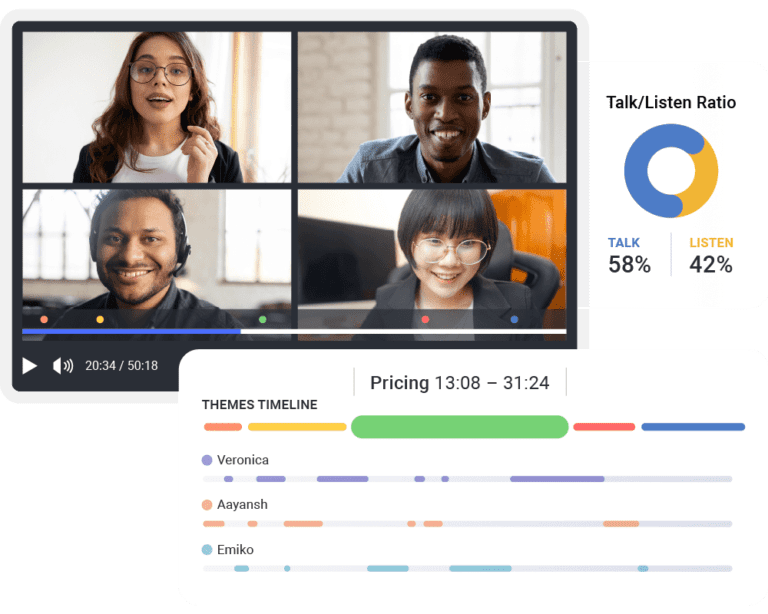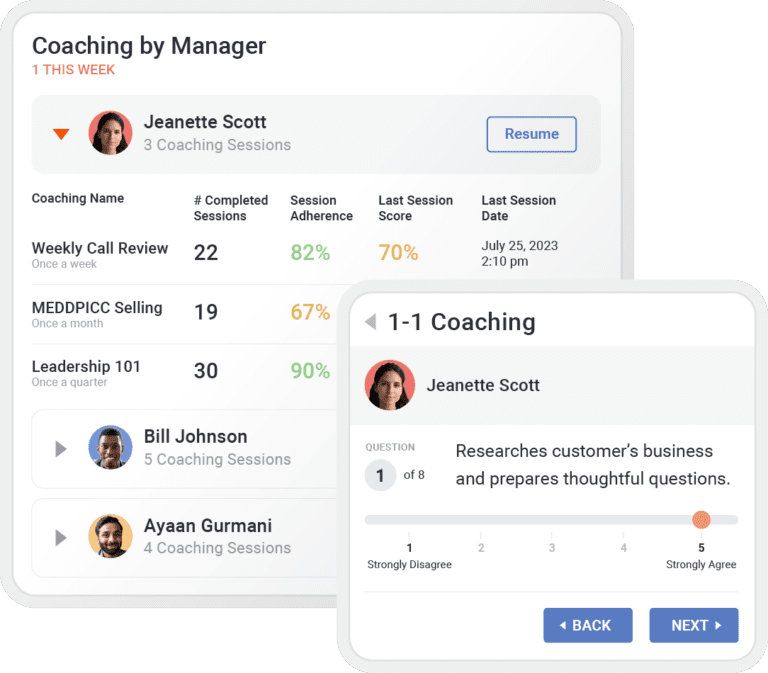The Complete Guide to AI Sales Assistants
![]() Poornima Mohandas
on
September 4, 2024
Poornima Mohandas
on
September 4, 2024
In the past, artificial intelligence was nothing more than a nebulous concept for most people. But today, it’s a must-have technology for any organization looking to stand out and grow in an increasingly competitive market.
In fact, a recent survey found that most revenue organizations already use AI sales assistants and other AI sales tools; only 24% don’t.
It’s no wonder why so many revenue leaders are investing in AI. AI sales assistants streamline and automate tasks and processes so sellers have more time to engage with buyers. When sellers have more time to engage with buyers, they can close more deals faster.
But what is an AI sales assistant – and how does this technology boost sales productivity and performance? You’ve come to the right place to find out.
In this post, we’ll explore everything you need to know about AI sales assistants, including:
- What an AI sales assistant is and how it works
- How this technology compares to conversation intelligence
- Why a growing number of revenue teams are embracing AI-powered sales assistants
- Some of the best AI sales assistant software options on the market today
What is an AI sales assistant?
First things first: what is an AI sales assistant?
The sales cycle consists of countless tasks and processes. Each one is necessary, but it requires a lot of time and effort.
An AI sales assistant is a tool or application that leverages artificial intelligence (including machine learning, natural language processing, and predictive analytics) to streamline and simplify the sales process and support sellers. AI sales assistants are also referred to by other names including
- Virtual sales assistants
- AI-powered sales assistants
- AI virtual sales assistants
AI-guided selling tools can streamline simple yet time-consuming tasks like data entry and meeting scheduling. This technology can also be used for more complex tasks, including prospecting, meeting preparation, and follow-up. We’ll look closely at specific use cases for AI sales assistants later.
Why are so many revenue organizations embracing AI sales assistants?
Why are so many revenue organizations embracing AI sales assistants?
AI virtual sales assistants streamline and automate many tasks that sellers once had to do independently. That means sellers have more time to provide personalized experiences that resonate with buyers and earn their business. Sellers can close more deals faster.
Furthermore, AI-powered sales assistants take the guesswork out of the sales process. Rather than acting on a hunch or gut feeling, sales reps can leverage data to determine what action to take next. This improves outcomes and accelerates the sales cycle.
The bottom line? AI sales assistants can increase the effectiveness and efficiency of your sales reps and streamline the sales cycle. Your sellers will be better equipped to engage buyers and close deals, and your bottom line will grow.
Conversation intelligence vs. AI sales assistants
You’ve probably heard the term “conversation intelligence” at least once or twice. But is conversation intelligence the sales thing as an AI sales assistant?
Conversation intelligence and AI sales assistants are certainly related, but they’re not the same.
What is conversation intelligence?
Conversation intelligence (or an AI sales call assistant) is a technology that leverages AI to record, transcribe, and analyze sales calls to provide more insight into customer interactions.
A conversation intelligence solution like Mindtickle’s Call AI analyzes each call and provides a score as well as feedback on things like:
- Sentiment
- Questions asked and answered
- Monologues
- Use of filler words
- Competitor mentions
- Objections
- Pain points
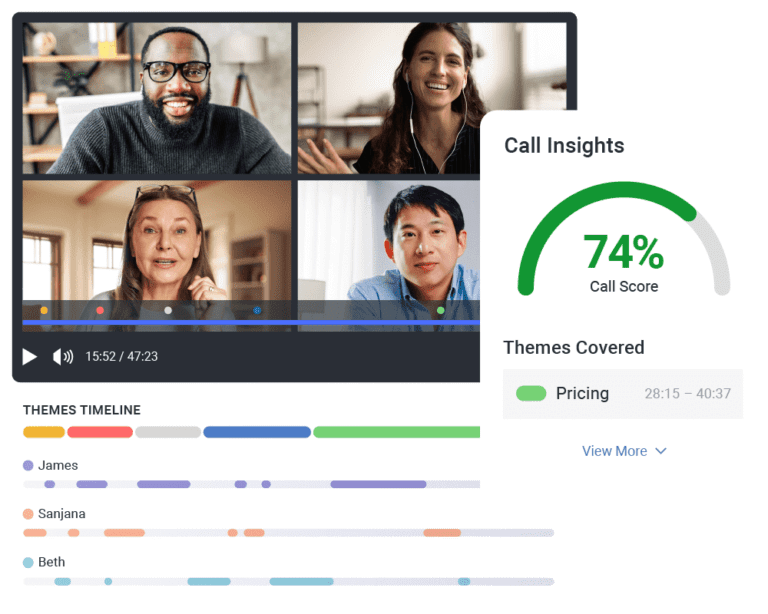
With a conversation intelligence solution, sales reps can focus on the call rather than taking notes. Reps can use conversation intelligence to review calls and follow up with AI-generated action items. In addition, conversation intelligence provides sales reps with real-time feedback on each call, which they can use to improve their behaviors and chances of closing the deal.
Sales managers can also use AI sales call assistants to see how things are going in the field without sitting in on sales reps’ calls. Managers can use the insights from conversation intelligence to provide targeted coaching that improves sales reps’ skills and behaviors.
What’s the difference between conversation intelligence and AI sales assistants?
AI-powered sales assistants are a technology category that streamlines sales processes and tasks and supports sellers. Conversation intelligence is one type of AI sales assistant specifically addressing customer interactions.
However, other AI sales assistants address another element (or elements) of the sales process.
| AI sales assistant | Conversation intelligence | |
|---|---|---|
| What it is | A tool that leverages AI to simplify and streamline the sales process and support sellers. | A tool that records and analyzes sales conversations to help revenue teams better understand customer interactions. |
| Goals | To improve sales processes and free up reps’ time so they can spend more time on revenue generating activities. |
|
| Who uses it | Revenue teams | Revenue teams |
| Tools | AI sales assistants may be standalone solutions or incorporated into existing sales tools and technologies | Conversation intelligence software, which may be a standalone solution or part of an integrated revenue enablement platform. |
How can you use an AI sales assistant to support your sales team?
AI sales assistants can improve the effectiveness and efficiency of your sellers. But getting started with an AI-powered sales assistant can seem overwhelming.
It doesn’t have to be. Start with one or two use cases, optimize them, and grow from there.
Here’s how AI sales assistants can empower your sellers to close more deals.
Delivering powerful insights for data-driven decision-making
Chances are, you have no shortage of data. But analyzing it and determining how to act on it can seem impossible.
AI sales assistants can analyze data from disparate sources and provide meaningful insights, fueling better decision-making.
Enabling sellers to prioritize their time properly
Sales reps only have so many hours in the day. Of course, you want them to spend their time with prospects most likely to convert. But often, this requires a lot of guesswork.
An AI sales assistant can leverage predictive analytics to determine which leads will likely convert to customers. Then, your teams can use that insight to prioritize properly.
Analyzing customer interactions
Every interaction with a customer is rich with insight. An AI sales assistant can transcribe and analyze each interaction to deliver insights that enable sales reps to improve the customer experience and sales outcomes. Sales reps can also use these insights to determine next steps and prepare for future meetings.
Accessing real-time feedback to improve skills
Sales coaching is key to improving performance, but sales reps can’t afford to sit around and wait for feedback from their managers.
An AI sales assistant can analyze client interactions and recorded role-plays and provide real-time feedback for improvement. Sales reps can use feedback delivered via AI sales coaching to sharpen their skills and increase their likelihood of closing deals.
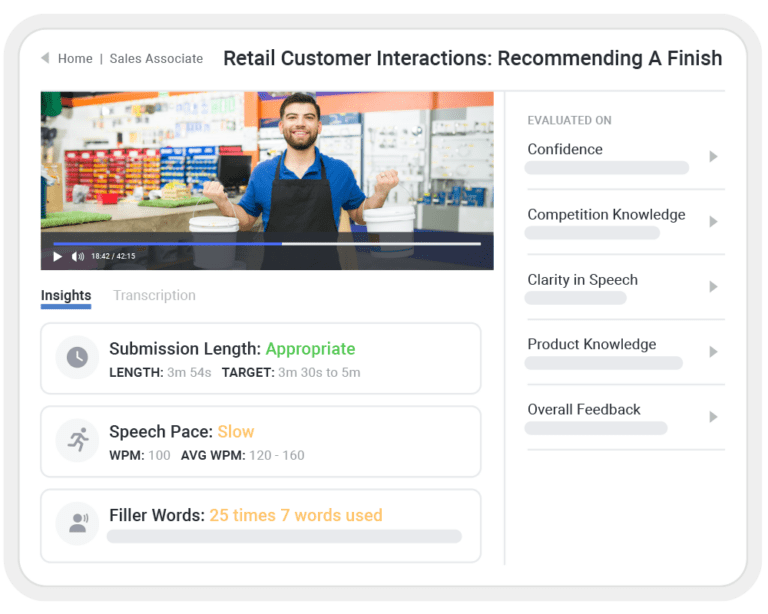
Some innovative vendors also offer interactive, AI-powered role-plays, which allow sales reps to practice their skills in realistic scenarios with an AI bot.
Getting proven content recommendations
Content is an important part of the B2B sales process. But often, sales reps waste precious time searching for content – which may or may not work for a specific sales scenario.
An AI assistant can leverage data and buyer signals to recommend the right content for every situation. Rather than guessing what will work, sales reps can use content that’s proven to work. An AI sales assistant can even draft a contextual message for the sales rep to send alongside the content.
Answering customers’ questions – quickly
Prospects are bound to have questions. It’s important to get them accurate answers – quickly.
In the past, a sales rep would pose a question (perhaps on Slack or another communication channel) and then wait for a response from a subject matter expert. With an AI sales assistant, the rep can ask their question and get an answer—along with approved, relevant resources to share with the customer.
Automating tedious tasks
According to Salesforce research, sales reps spend less than 30% of their time selling. That’s because tedious (but necessary) tasks often bog them down.
Sales reps spend only
An AI sales assistant can automate many of these mundane tasks. That means sellers can spend more time engaging buyers, delivering great experiences, and closing deals.
What is the best AI sales assistant software?
With the right AI sales assistant software, you can significantly improve the performance of your entire sales team. But what’s the best AI sales assistant software available today?
There’s no easy answer. The best AI sales assistant software is the one that addresses the needs and goals of your organization.
However, some AI sales assistant software tools are particularly popular.
Mindtickle
Some AI sales assistant software addresses a single challenge or pain point. Mindtickle addresses several.
Mindtickle is an integrated revenue enablement platform that incorporates onboarding, sales training, content, coaching, conversation intelligence, and more—all from one platform. Revenue enablement teams can build, deliver, and measure personalized programs that address the needs of each seller. Sellers can access everything they need to be ready for any deal—all from one platform.
Mindtickle Copilot, Mindtickle’s AI sales assistant tool, enables sales reps to work smarter and faster.
With Mindtickle Copilot, sales reps can automate tedious tasks, freeing up their time to delight customers. For example, sales reps can use Mindtickle Copilot to draft follow-up messages and identify insights from previous customer interactions. They can also ask questions and get real-time answers, along with supporting resources.
In addition, Mindtickle Copilot enables sellers to leverage data to make better decisions. Sales reps can determine what action to take next to move a deal forward or get suggestions for content that has resonated in similar scenarios to share with a seller.
Mindtickle also leverages AI to deliver real-time feedback to sales reps. For example, a seller receives a score and feedback from each sales conversation via conversation intelligence. They can use this feedback to improve and increase their chances of closing the deal.
Sales reps can also submit recorded role-plays or engage in interactive, AI-powered role-plays. In either case, the rep gets immediate feedback for improving their behaviors without having to wait around for a sales manager.
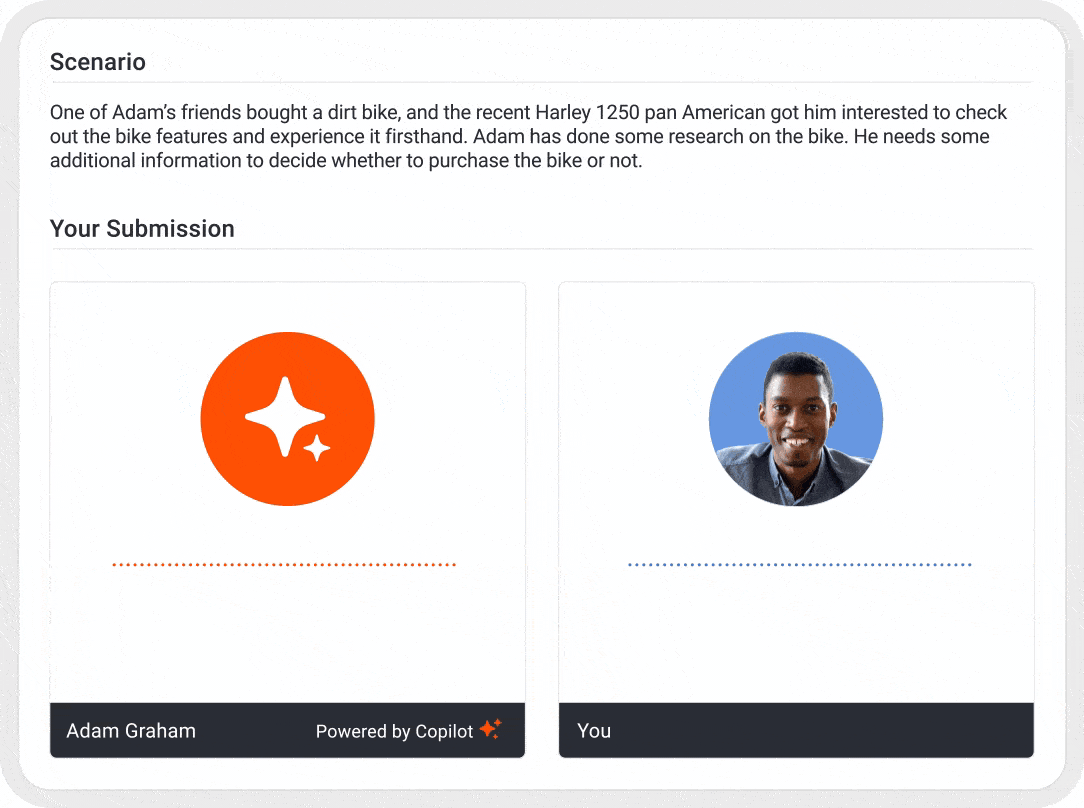
Drift
Increasingly, B2B buyers make decisions based on their experiences with a business. Drift is an AI sales assistant tool that listens and learns from buyers. It uses this data to provide personalized experiences to buyers throughout the purchase journey. Revenue teams use Drift to engage with prospects, book meetings, and pre-qualify leads.
Clari
Clari is a popular revenue platform that helps teams engage buyers, optimize the sales process, and predict revenue outcomes. It incorporates Clari Copilot, an AI sales assistant that makes it easier for teams to make revenue calls, analyze deals, forecast sales, and more.
ZoomInfo
Any sales rep knows that prospecting is important. But it can take a lot of time and effort to ensure you’re connecting with the right people at the right companies. ZoomInfo is a popular prospecting platform that helps sales reps ensure they’re connecting with people who are a good fit for their products or services. ZoomInfo Copilot is an AI sales assistant that helps sellers know which accounts to prioritize and how best to engage them.
Gong
Gong is a popular revenue intelligence platform that helps teams better understand customer interactions. It leverages AI to deliver insights based on customer interactions. When you better understand your customer interactions, you can more effectively act on them and know what step to take next to engage them.
It’s time to embrace AI sales assistants to supercharge sales performance
Already, winning revenue organizations are tapping into AI sales assistants to boost the effectiveness and efficiency of their sales teams and deliver winning experiences that delight customers.
Competition is fierce. You risk getting left behind if you’re not already leveraging AI today.
Now’s the time to identify ways your organization can leverage AI sales assistants to streamline the sales process and support sellers as they engage buyers and close deals.
AI in action with Mindtickle
Ready to get a firsthand look at how Mindtickle’s AI features and functionality can supercharge your revenue growth?
Get Your Demo



